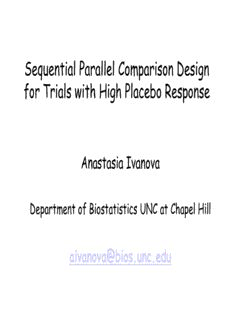
Anastasia Ivanova PDF
Preview Anastasia Ivanova
Sequential Parallel Comparison Design for Trials with High Placebo Response Anastasia Ivanova Department of Biostatistics UNC at Chapel Hill [email protected] Placebo response 2 Increased placebo response over time Data from 86 major depressive disorder trials submitted to FDA during 1986 to 2008 (Khin et al., 2011) + US trials - Non US trials 3 Diminished treatment effect over time . + US trials - Non US trials 4 Rising placebo response RCTs and failed trials Undurraga and Baldessarini 2012 Placebo response • In many studies in depression and schizophrenia considered by FDA over 12 year period, 1987 through 1999, in which investigational drug could not be distinguished from placebo also included an active standard drug that could not be distinguish from placebo (Laughren, 2001). 6 Placebo response Yellow pills make the most effective antidepressants, like little doses of pharmaceutical sunshine Red pills can give you a more stimulating kick More is better Placebos taken four times a day deliver greater relief than those taken twice daily. More $ is better Waber, RL, Shiv, B, Carmon, Z, Ariely, D (2008). Commercial 7 features of placebo and therapeutic efficacy. JAMA 299: 1016-1017. Partial List of Illnesses Cited as Having Significant Placebo Responses Organized by FDA Center for Drug Evaluation and Research Review Divisions Anesthesia, Analgesic and Gastroenterology (cont.) Psychiatry (cont.) Rheumatology – Nausea – Chronic Fatigue syndrome – Arthritis – Obesity – Depression – Pain – Reflux esophagitis – Insomnia – Psoriatic arthritis – Ulcerative colitis – Panic disorders – Rheumatic diseases Neurology – Schizophrenia Anti-viral – Alzheimer’s Disease – Social Phobia – Herpes simplex – Autism Pulmonary and Allergy Cardiovascular and Renal – Epilepsy – Allergies – Heart failure, congestive – Headache – Asthma – Hypertension – Migraine – Cough Ear, Nose and Throat – Multiple Sclerosis – Cystic Fibrosis – Tinnitus – Parkinson’s disease – Food allergy Gastroenterology – Restless leg syndrome Reproductive and Urologic – Crohn’s disease Psychiatry – Benign prostatic – Dyspepsia and gastric – ADHD enlargement motility – Anxiety disorders – Erectile dysfunction – Gastric and duodenal – Binge eating disorder – Premenstrual dysphoric ulcers – Bipolar mania disorder – GERD – Sexual dysfunction, women – Irritable bowel syndrome – Vulvar vestibulitis – Urinary incontinence 8 Design options to lower placebo response Option 1. Parallel single stage design R A N PLACEBO D O M I DRUG Z E 9 Option 2: The Placebo Lead-in R PLACEBO A No PLACEBO N Response D O M DRUG I Z E Use placebo lead-in (run-in) to eliminate placebo responders 10
Description: